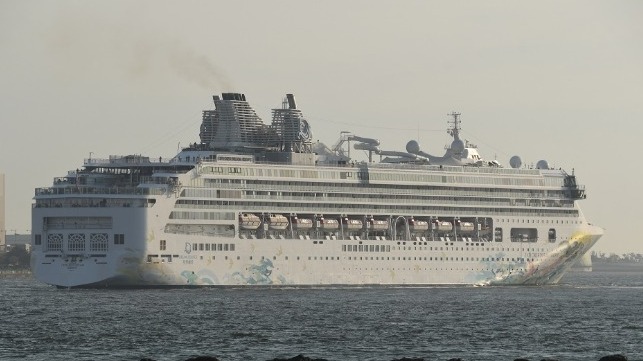BV, DNV GL Launch Infection-Prevention Certifications for Cruise Ships

Two leading class societies are helping the passenger vessel sector restore operations by rolling out new certifications for infection prevention measures.
Class has played a key role in certifying safety since the Age of Sail, and many class societies have diversified into certification for shoreside sectors as well - like healthcare and hospitality. Both DNV GL and Bureau Veritas have public health-related experience from their work for clients on shore, and both have introduced shipboard infection-prevention certifications that unify that knowledge with their maritime expertise.
Hospital experience comes to shipping
DNV GL is a household name in the maritime industry, but it also has a strong presence on shore. Over the years, it has accredited 630 hospitals through its Healthcare division, and its health industry-oriented infection prevention certification launched six years ago. The new maritime-specific version of this protocol, dubbed CIP-M, is intended as a "hospital grade" risk-based solution for managing infectious disease threats. It is particularly targeted at the cruise and ropax segments, where it may be helpful in reassuring passengers and regulators that the ship is ready for safe operations.
“CIP-M is unique in that it builds on proven hospital standards but is specifically tailored to the context of passenger vessels, while incorporating national requirements," said Luca Crisciotti, CEO of DNV GL Business Assurance.
As part of the certification process, DNV GL assesses the vessel's sanitation procedures, food preparation and handling, physical distancing measures, crewmember PPE usage, emergency response plans, pre-boarding screening and itinerary or port planning protocols. Continued compliance will be verified with an annual onboard survey.
Genting Cruise Lines will be the first operator to sign on for CIP-M certification, and it plans to use it first aboard the cruise ship Explorer Dream.
"Genting is taking a lead in a sector so adversely affected by the pandemic and really trying to restore both industry and passenger confidence . . . doing something tangible and something that has proven very useful for the hospital and medical industries," said DNV GL Maritime CEO Knut Ørbeck-Nilssen in a videoconference Tuesday.
In keeping with DNV GL's digitalization efforts, each certificate is accompanied by a blockchain-enabled digital authentication mechanism so that regulators and customers can verify the source. Crisciotti said that his division is seeing a rising number of fake certificates in health-related industries - for example, unscrupulous manufacturers modifying certificates to show false information about a product. Blockchain verification allows all parties a secure way to check on certificate authenticity.
Restarting business
Bureau Veritas (BV) has already launched an infection prevention certification scheme for onshore businesses of all types, from cafes to hotels to manufacturing plants. Its "Restart Your Business with BV" program is now available for ferries, cruise ships and other vessel classes as well.
"Confidence is critical. 'Restart' provides that confidence. Passengers, the crew and all stakeholders engaged in operations on board, in ports and in transit will be able to see that a ship has been assigned the Bureau Veritas ‘Safeguard’ label. By addressing the real risks, with transparency, the necessary trust and confidence can be fostered to support a safe restart and maintain operations thereafter," said Matthieu de Tugny, President Bureau Veritas, Marine & Offshore.

that matters most
Get the latest maritime news delivered to your inbox daily.
While intended for the passenger vessel market, the certification could have applicability for other sectors - for example, work boats, OSVs and any ship with frequent crew changes.
"The Safeguard badge demonstrates an operator has addressed health, safety and hygiene requirements, has properly implemented necessary procedures, has trained the crew and all employees on board and has well agreed procedures with ports and terminals – and, finally, that a BV audit has been concluded satisfactorily," said BV global market leader for passenger vessels Andreas Ullrich.
